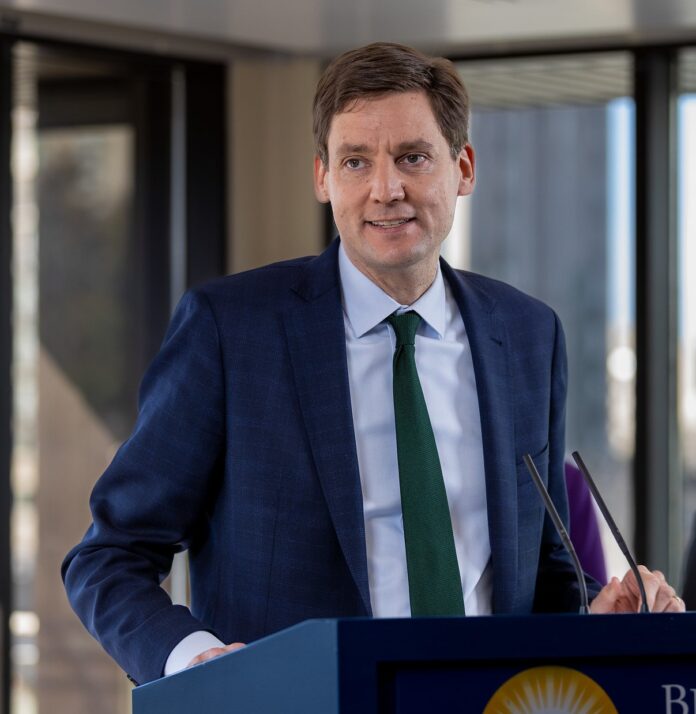PREMIER David Eby is leading a trade mission to Asia.
The mission will bolster B.C.’s trade and investment ties in the Indo-Pacific, the world’s fastest-growing economic region, and advance the Province’s new Trade Diversification Strategy.
“B.C. has so much to offer the world: a talented workforce, sustainable products and services, and an abundance of the natural resources, technology and energy needed to power the clean economy,” Eby said on Thursday.
“The global turbulence of the past few years has shown us that building strong relationships with diverse trading partners is key to growing our economy and creating opportunities for British Columbians. This mission will help expand our presence in the rapidly growing and competitive Indo-Pacific market.”
The trade mission includes Japan, the Republic of Korea (ROK), Singapore and Vietnam, and goes from May 25 until June 7.
Eby will go to Japan, the ROK and Singapore. In Japan and the ROK, he will be accompanied by Josie Osborne, Minister of Energy, Mines and Low Carbon Innovation; Brenda Bailey, Minister of Jobs, Economic Development and Innovation; and Jagrup Brar, Minister of State for Trade.
Brar will also travel to Vietnam to meet with business leaders and officially open B.C.’s trade and investment representative office, which will help B.C. businesses gain better access to a priority market.
“The Indo-Pacific is opening up for business again and it’s essential for B.C. to have a seat at the table to promote our world-class businesses and sustain our nation-leading economic recovery,” Bailey said. “Sitting down face to face with key trading partners will allow us to build authentic relationships, help B.C. businesses reach international markets and create more family-supporting jobs for British Columbians.”
In each market, the Premier and ministers will meet with government officials and economic leaders to discuss trade, investment and partnership opportunities in key sectors, such as clean technology, renewable energy, natural resources and critical minerals, information and communications technology, and agrifood. Additionally, they will discuss shared priorities, such as affordable housing, and promote educational and cultural exchanges between jurisdictions.
The Premier and ministers will also promote B.C. as a jurisdiction that values high environmental, social and governance (ESG) standards, supports high-performing organizations and welcomes like-minded partners.
“B.C. has the clean energy and critical minerals that the world needs as we work together to build a low-carbon economy,” Osborne said. “This trade mission gives us a chance to showcase B.C.’s ESG advantage, attract investors who share our goals and values, and support good, well-paying jobs for people back at home.”
The mission follows the Province’s launch of its new Trade Diversification Strategy on May 5. The strategy, which is a commitment in the StrongerBC Economic Plan, outlines actions to increase export and investment opportunities in B.C.’s new and emerging markets, including Vietnam and Singapore, while expanding in existing markets, such as Japan and the ROK.
“People and businesses in British Columbians continue to contend with global inflation, supply chain challenges and labour shortages,” Brar said. “Diversifying our trade relationships and strengthening our existing connections will help protect British Columbians from uncertain global economic forces and allow us to sustainably grow our economy. This trade mission supports our StrongerBC Economic Plan and our Trade Diversification Strategy, as well as our ultimate goal to build a stronger, more secure B.C. for everyone.”
Itinerary:
May 25-27: Brar in Vietnam
May 27-31: Premier and ministers in Japan
May 31-June 3: Premier and ministers in the ROK
June 3-7: Premier in Singapore
Quick Facts:
* The value of B.C.’s imports and exports represents one-half of the province’s overall economy.
* From 2021 to 2022, B.C.’s exports increased by more than 20% to $64.9 billion, mostly due to an increase in exports to the U.S., Japan, the ROK and India.
* Japan and the ROK are B.C.’s third- and fourth-largest export markets, respectively.
* Singapore and Vietnam are B.C.’s 22nd- and 25th-largest export markets, respectively, while serving as important partners in the Association of Southeast Asian Nations.
* In November 2022, the federal government released its Indo-Pacific Strategy, which states that the region makes up more than one-third of all global economic activity and is projected to account for more than half by 2040.










